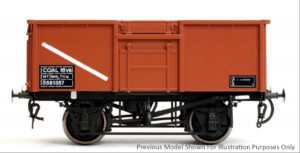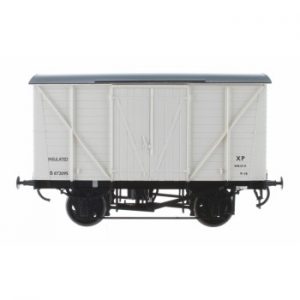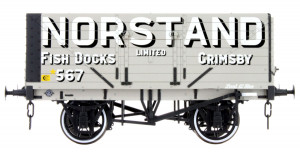Description
British Railways standardised on the 16 Ton mineral wagon and constructed nearly 240,000 wagons between 1950 and 1959. The main use was for shipping of coal although sugar beet, scrap metal, spoil and aggregates were also carried. The majority approximately197,000 were constructed to Diagram 1/108. These had welded bodies with top flap doors, and apart from 10,000 all had one-sided Morton brake rigging.
The other main build was for 25,000 wagons to Diagram 1/109. These had riveted bodies, and riveted side doors, top flap doors and a pressed end door. Again the majority nearly 24,000 had the one sided Morton brake rigging.
During 1951 100 vacuum-braked vehicles were constructed for trials and issued Diagram 1/114, being fitted with the Morton four-shoe vacuum brake.
In 1966 BR changed its policy on mineral wagon braking systems and converted 5,000 unfitted wagons to Morton vacuum brake. This necessitated the addition of a vacuum cylinder together with an extra pair of brake shoes. They were originally assembled in block trains. BR also instigated a massive rebuilding programme during the 1970’s for rusted out wagons by making new bodies and fitting them to good chassis. It was decided to eliminate the top flap door, which produced a far stronger body and Diagram 1/099 was issued for this conversion. The unfitted wagons lasted up to 1982 and the vacuum fitted up to 1987. For further historical information please see the three articles by Peter Fidczuk in Modellers’ Back Track volume 1, numbers 3 to 5.
The Dapol 16T Mineral Wagon features:
Finely moulded body shell.
Finely applied livery and printed details
Die-cast Chassis with metal floor for added weight, a compensating beam on on side to improve running performance.
Fitted with Fine scale wheels for O Gauge track.
Metal sprung buffers
Die-cast hook and metal coupling links.
Solebars, axle boxes and break gear components are moulded in ABS plastic for strength.





